

Oceanus. Oceanus (/oʊˈsiːənəs/; Ancient Greek: Ὠκεανός (Ōkeanós);[2] pronounced [ɔːkeanós]) was a pseudo-geographical feature in classical antiquity, believed by the ancient Greeks and Romans to be the divine personification of the World Ocean, an enormous river encircling the world.
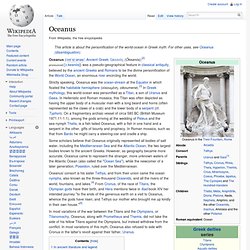
Some scholars believe that Oceanus originally represented all bodies of salt water, including the Mediterranean Sea and the Atlantic Ocean, the two largest bodies known to the ancient Greeks. Hyperion (mythology) Hyperion's son Helios was referred to in early mythological writings as Helios Hyperion (Ἥλιος Ὑπερίων, "Sun High-one").
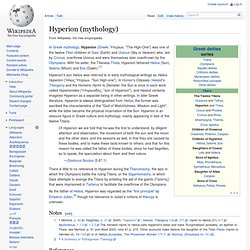
In Homer's Odyssey, Hesiod's Theogony and the Homeric Hymn to Demeter, the Sun is once in each work called Hyperionides (Ὑπεριωνίδης, "son of Hyperion"), and Hesiod certainly imagines Hyperion as a separate being in other writings. Cronus. Ruler of the Titans in Ancient Greek mythology Mythology[edit] Only Cronus was willing to do the deed, so Gaia gave him the sickle and placed him in ambush.[4] When Uranus met with Gaia, Cronus attacked him with the sickle, castrating him and casting his testicles into the sea.
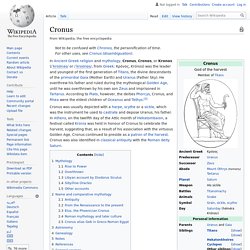
From the blood that spilled out from Uranus and fell upon the earth, the Gigantes, Erinyes, and Meliae were produced. The testicles produced a white foam from which the goddess Aphrodite emerged. For this, Uranus threatened vengeance and called his sons Titenes[a] for overstepping their boundaries and daring to commit such an act. Cronus learned from Gaia and Uranus that he was destined to be overcome by his own sons, just as he had overthrown his father. Rhea secretly gave birth to Zeus in Crete, and handed Cronus a stone wrapped in swaddling clothes, also known as the Omphalos Stone, which he promptly swallowed, thinking that it was his son.
Crius. See also[edit] Greek mythology in popular culture Notes[edit] Jump up ^ Etymology uncertain: traditionally considered a variation of κρῑός "ram"; the word κρεῖος was also extant in Ancient Greek but only in the sense of "type of mussel" [1][2].Jump up ^ "About the other siblings of Kronos no close inquiry is called for," observes Friedrich Solmsen, in discussing "The Two Near Eastern Sources of Hesiod", Hermes 117.4 (1989:413–422) p. 419.
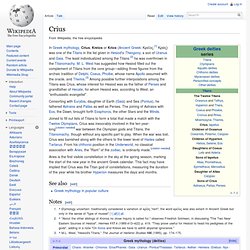
"They prove useful for Hesiod to head his pedigrees of the gods", adding in a note "On Koios and Kreios we have to admit abysmal ignorance. "Jump up ^ M.L. Coeus. Given that Phoebe symbolized prophetic wisdom just as Coeus represented rational intelligence, the couple may have possibly functioned together as the primal font of all knowledge in the cosmos.
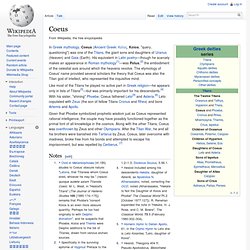
Along with the other Titans, Coeus was overthrown by Zeus and other Olympians. After the Titan War, he and all his brothers were banished into Tartarus by Zeus. Coeus, later overcome with madness, broke free from his bonds and attempted to escape his imprisonment, but was repelled by Cerberus. [7] Notes[edit] References[edit] External links[edit] Iapetus (mythology) In Hesiod's Works and Days Prometheus is addressed as "son of Iapetus", and no mother is named.
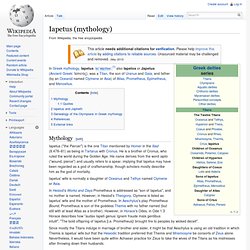
However, in Hesiod's Theogony, Clymene is listed as Iapetus' wife and the mother of Prometheus. In Aeschylus's play Prometheus Bound, Prometheus is son of the goddess Themis with no father named (but still with at least Atlas as a brother). However, in Horace's Odes, in Ode 1.3 Horace describes how "audax Iapeti genus/ Ignem fraude mala gentibus intulit"; "The bold offspring of Iapetus [i.e. Prometheus]/ brought fire to peoples by wicked deceit". Since mostly the Titans indulge in marriage of brother and sister, it might be that Aeschylus is using an old tradition in which Themis is Iapetus' wife but that the Hesiodic tradition preferred that Themis and Mnemosyne be consorts of Zeus alone. Pausanias (8.27.15) wrote: Stephanus of Byzantium quotes Athenodorus of Tarsus: This may be the same Anchiale who appears in the Argonautica (1.1120f): Jump up ^ Wells, John (14 April 2010).